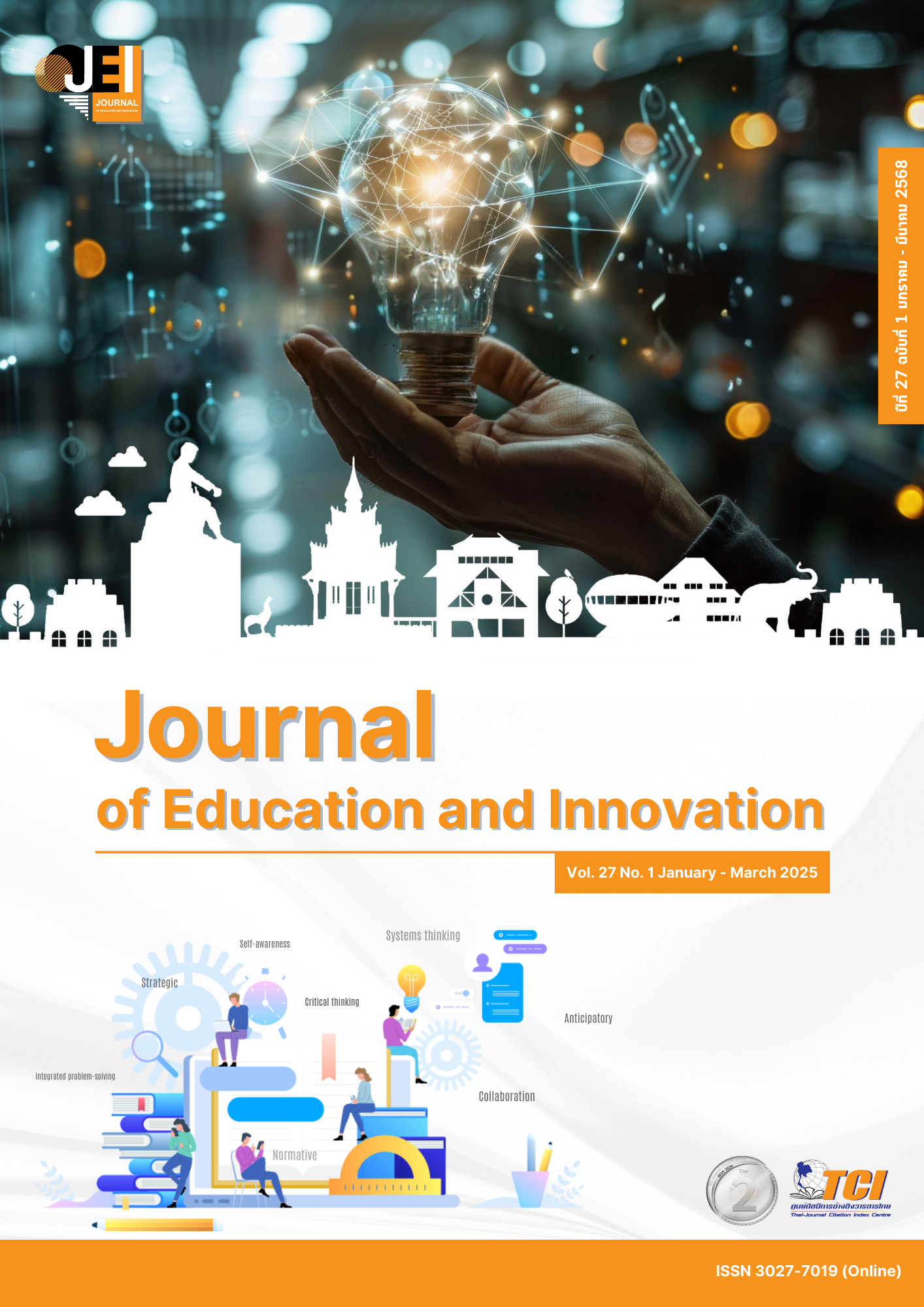GUIDELINES FOR ENHANCING THAI TEACHERS’ ARTIFICIAL INTELLIGENCE LITERACY IN THE DIGITAL AGE
Main Article Content
Abstract
In the rapidly evolving digital age, Thai teachers must adapt to remain effective. This research aims to examine the level of artificial intelligence (AI) literacy among Thai teachers, analyze factors influencing their AI literacy, and develop guidelines to enhance this literacy. An explanatory sequential mixed-methods design was utilized, beginning with a quantitative survey of 584 Thai teachers to assess their AI literacy levels, followed by semi-structured interviews with 12 teachers selected from the initial sample for in-depth analysis of influencing factors. The findings from both quantitative and qualitative data were synthesized to draft AI literacy enhancement guidelines, which were then reviewed by experts to ensure quality and suitability. The study revealed that Thai teachers’ AI literacy level was moderate (M = 2.89, SD = 0.70). Teachers demonstrated an awareness of AI's benefits but lacked proficiency in practical application. Key factors affecting AI literacy included technological, personal, and environmental influences. The development of AI literacy enhancement guidelines encompasses three key areas including strategic actions for school administrators, practical measures for teachers, and curriculum and training design focusing on the ethical and safe use of AI. This research contributes to improving AI literacy among Thai educators and supports educational policymakers in crafting AI integration strategies, preparing teachers to adapt effectively to the evolving digital age. Additionally, promoting a clear understanding and responsible use of AI will create a strong foundation for Thailand's education system. This approach will empower Thai society to fully leverage AI technology, contributing to sustainable development across economic, social, and cultural dimensions.
Article Details

This work is licensed under a Creative Commons Attribution-NonCommercial-NoDerivatives 4.0 International License.
The owner of the article does not copy or violate any of its copyright. If any copyright infringement occurs or prosecution, in any case, the Editorial Board is not involved in all the rights to the owner of the article to be performed.
References
COMEST. (2019). Preliminary study on the Ethics of Artificial Intelligence. Retrieved from https://unesdoc.unesco.org/ark:/48223/pf0000367823
Economou, A. (2023). Building teachers’ digital competence through a self-reflection process. In S. James & C. Elizabeth (Eds.), Proceedings of the 3rd Annual Meeting of the International Society of the Learning Sciences (pp. 1242–1245). DOI: 10.5220/0007679005410548
Education Technology Development and Integration Support (ETS). (2024). AI and Future Education 2030: Opportunities and Challenges. Retrieved from https://www.ets.kmutt.ac.th/post/ai-in-education
European Commission. (2018). Communication Artificial Intelligence for Europe. Retrieved from https://digital-strategy.ec.europa.eu/en/library/communication-artificial-intelligence-europe9
European Commission. (2017). The European Framework for the Digital Competence of Educators. Retrieved from https://publications.jrc.ec.europa.eu/repository/handle/JRC107466
European Commission. (2022). Ethical guidelines on the use of artificial intelligence and data in teaching and learning for educators. Retrieved from https://education.ec.europa.eu/news/ethical-guidelines-on-the-use-of-artificial-intelligence-and-data-in-teaching-and-learning-for-educators
Haenlein, M., & Kaplan, A. (2019). A Brief History of Artificial Intelligence: On the Past, Present, and Future of Artificial Intelligence. Sage Journal, 61(4). DOI: 10.1177/0008125619864925
Hagendorff, T. (2020). The ethics of AI ethics: An evaluation of guidelines. Minds and Machines, 30(1), 99-120.
Korinek, A., & Stiglitz, J. E. (2021). Artificial intelligence, globalization, and strategies for economic development (No. 28453). Retrieved from http://www.nber.org/papers/w28453
McBride. (2015). Children's Literacy Development. Routledge: London.
McCarthy. (2007). What is Artificial Intelligence? Retrieved from https://www-formal.stanford.edu/jmc/whatisai.pdf
Ng, T. K., Leung, J. K. L., Chu, K. W. S., & Qiao, M. S. (2021). AI literacy: Definition, teaching, evaluation and ethical issues. Proceedings of the Association for Information Science and Technology, 58(1), 504-509.
Nunnally, J. C., & Bernstein, I. H. (1994). The Assessment of Reliability. Psychometric Theory, 3, 248-292.
Robinson, S. C. (2020). Trust, transparency, and openness: How inclusion of cultural values shapes Nordic national public policy strategies for artificial intelligence (AI) Technology in Society, 63, 101421.
Sriwat, K. (2023). When education faces AI: What aspects does Thai education need? The 101 World. Retrieved from https://www.the101.world/ai-for-teaching-and-learning/
Steinbauer-Wagner, G., Kandlhofer, M., Chklovski, T., Heintz, F., & Koenig, S. (2021). A Differentiated Discussion About AI Education K-12. Künstliche Intelligenz, 35(2), 131-137. DOI: 10.1007/s13218-021-00724-8
Suksomanat, N., & Moolsilpa, P. (2023). Model to enhance the potential of computer engineering students in artificial intelligence case study: three public universities in Bangkok (Doctoral dissertation). Bangkok: Srinakharinwirot University.
UNESCO Institute for Information Technologies in Education (UNESCO IITE). (2020). AI in Education: Change at the Speed of Learning. Retrieved from https://unesdoc.unesco.org/ark:/48223/pf0000374947?posInSet=55&queryId=
edd622-6c66-452e-930c-666cd7182bdf
UNESCO. (2018). UNESCO ICT Competency Framework for Teachers. Retrieved from https://unesdoc.unesco.org/ark:/48223/pf0000265721
UNESCO. (2021). AI and Education: Guidance for Policy-Makers. DOI: 10.54675/PCSP7350.
UNESCO. (2023a). Guidance for generative AI in education and research. DOI: 10.54675/EWZM9535
UNESCO. (2023c). How generative AI is reshaping education in Asia-Pacific. Retrieved from https://www.unesco.org/en/articles/how-generative-ai-reshaping-education-asia-pacific
UNESCO. (2024). Global Toolkit on AI and the Rule of Law for the Judiciary. UNESCO: Paris.
UNICEF Innocenti. (2023). Policy guidance on AI for children. Retrieved from https://www.unicef.org/innocenti/reports/policy-guidance-ai-children
Wang, B., Rau, P., & Yuan, T. (2022). Measuring user competence in using artificial intelligence: validity and reliability of artificial intelligence literacy scale. Behaviour and Information Technology, 42(3), 1-14.


